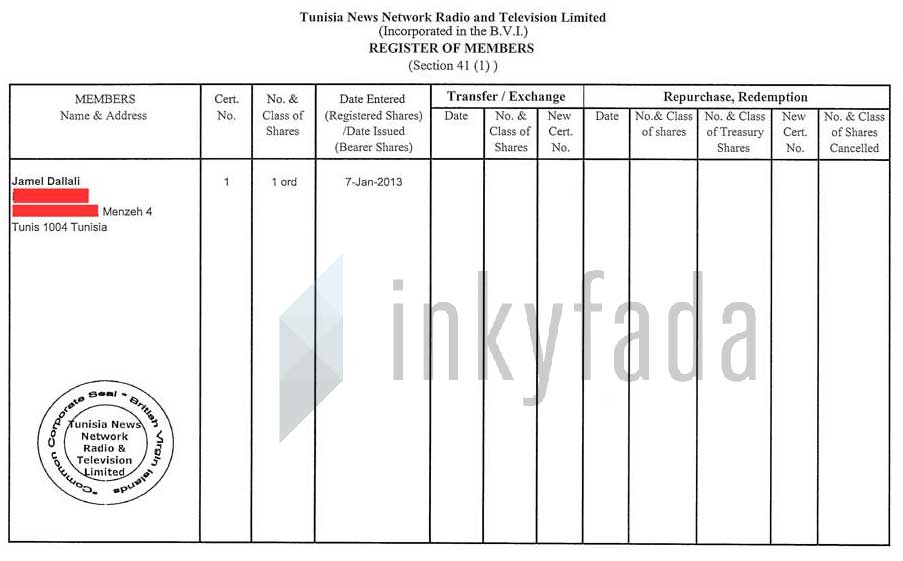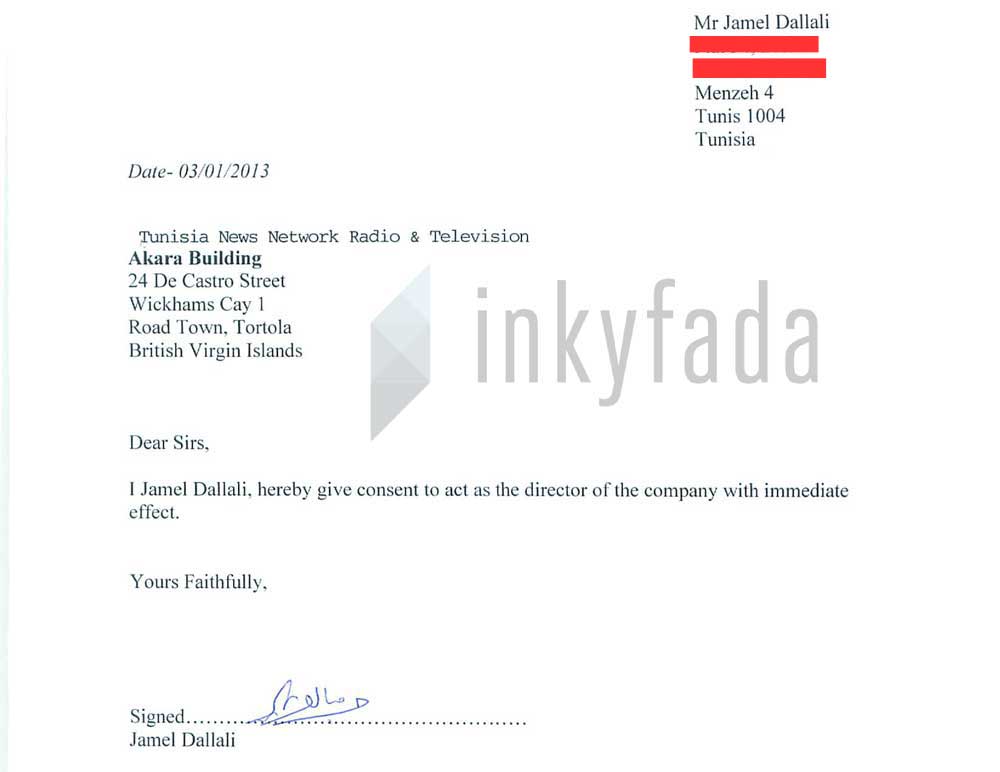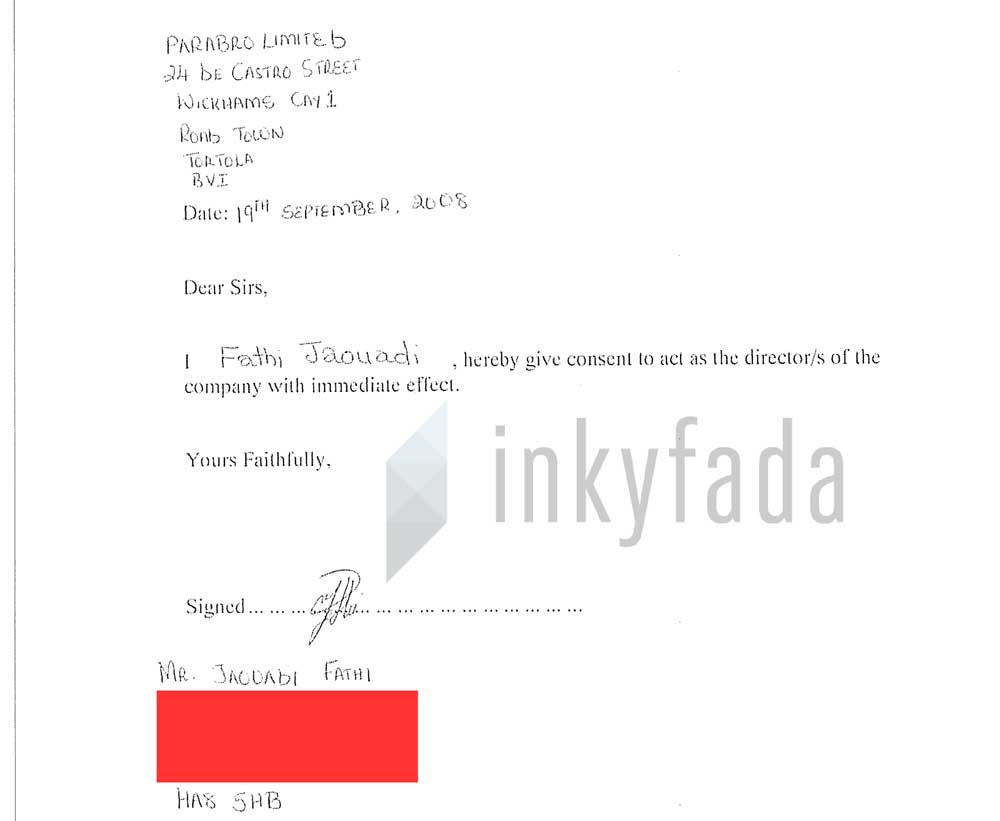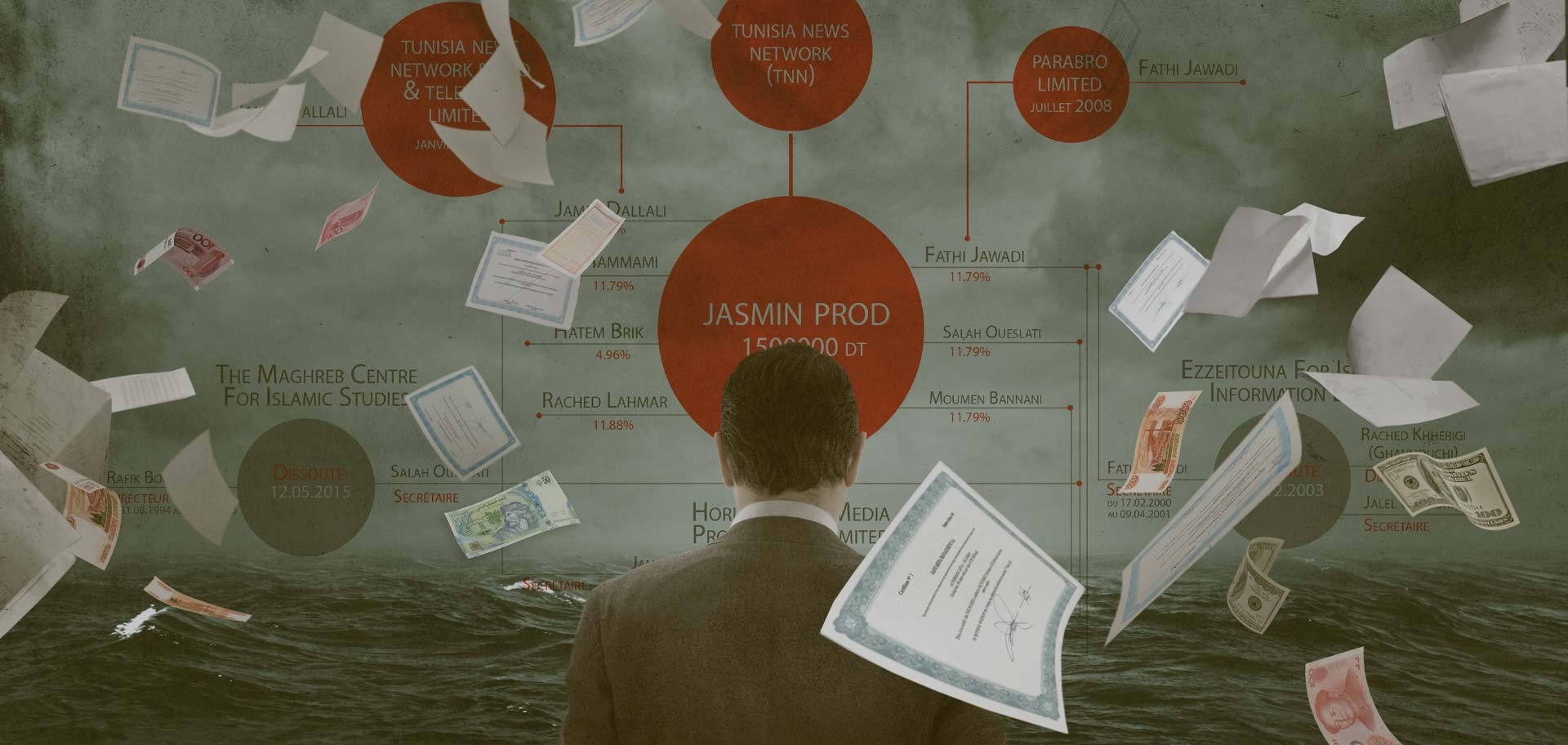Leaked documents from the Panama-based law firm Mossack Fonseca reveal that a company was created in the British Virgin Islands in January 2013. The company was registered under a household name in Tunisia: Tunisia News Network Radio and Television Limited (TNN). At the time, the company’s director and only shareholder was based in El Menzah, in the suburbs of Tunis. His name is Jamel Dallali.

Register of TNN Radio and Television Limited’s shareholders
TNN’s two-way mirror
Inkyfada managed to get Jamel Dallali on the phone for the first time on April 4th, 2017. When questioned about his offshore company, Dallali denied all information contained in the leaked documents. “Your information is false, I have no connection with this company,” he asserted. When informed that a copy of his passport was among the leaked documents, he said that “anybody could have gotten my passport number.” He also claimed to have left TNN.
Ten days later, in an email addressed to Inkyfada, Dallali changed his story.
“The company ‘Tunisia News Network Radio and Television’ was created in order to preserve the commercial name of the chain. It is a company that has been inactive since its registration up to now and it hasn’t had any financial or commercial activity, nor even a bank account. I am the sole shareholder,” he wrote.
Dallali added that he was referred to Mossack Fonseca by a consulting firm that he often works with in Great Britain, where, he says, “ the registration of such companies is ordinary practice.”

Appointment of Jamel Dallali as Director of TNN Radio and Television Limited
To clarify whether the secret company registered abroad could feasibly “ prevent the use of the chain’s name . . . which may affect its image,” Inkyfada consulted Yassine Younsi, an attorney specializing in intellectual property law.
Younsi explained that “ the creation of an overseas company does not ensure the ownership of a brand.” In the Tunisian system, the owner of a brand must register the name with the Institut national de la normalisation et de la propriété industrielle (INNORPI). On the international level, companies can take advantage of the Madrid system, administered by the World Intellectual Property Organization, which “allows a trademark to be registered worldwide and managed in several countries by submitting a single application, which protects the brand in the territories of the 113 member countries.”
Jamel Dallali registered Tunisia News Network in October 2013, but the name was not protected internationally.
Thus, contrary to his statements, registering his company in the British Virgin Islands did not reinforce the brand’s protections. “ He can register the name of the company through a simple request in the country where he wishes to have it protected, without needing to create a company,” confirmed Dr. Brahim Latrech, a lawyer with the Tunis Bar.
Jamel Dallali, Jasmin Prod, and TNN under one roof
In June 2011, a year and a half before Dallali registered Tunisia News Network Radio and Television Limited, another company, called Jasmine Prod, appeared as a newly registered company in the Official Gazette of the Republic of Tunisia (JORT). Jasmin Prod’s main activity was listed as audio-visual production. Not long after, Jasmin Prod became the holding company of TNN, which was established in 2012. In September 2014, TNN gained its license from the High Independent Authority of the Audiovisual Commission in Tunisia (HAICA).
After comparing official documents from October 2014 to the company’s trade register, Inkyfada found that Jamel Dallali was the main shareholder of Jasmin Prod, with 36% of the shares, and served as the director of the company until TNN obtained its licence from HAICA. At that point, the capital of Jasmin Prod was shared between seven shareholders, and a man by the name of Fathi Jaouadi was nominated to be the new director.
We were also able to confirm that Jasmine Prod, the offshore company Tunisia News Network Radio and Television Limited, and the Tunisian television chain TNN all share the same address.
The new director of TNN
Before serving as the director of Tunisia-based TNN, Fathi Jaouadi had turned his back on Ben Ali’s rule and built his career in England. There, he would come into close contact with exiled members of Tunisia’s Ennahdha movement.
According to Jaouadi, Dallali followed the normal procedure in registering TNN in the British Virgin Islands in order to “ protect its intellectual property rights.” “Why not? In Great Britain, it is something banal. Anyone can register a company in seconds in the Virgin Islands,” he said during an interview with Inkyfada on April 14th.
Jaouadi echoed Dallali when justifying the offshore company: it’s about “ intellectual property,” it has “ no commercial or financial activity,” and it’s just “ an inactive company.” He claimed to not take issue with the fact that the company’s intellectual property could only be held by one person. In the case of a disagreement, “ the management board [of Jasmin Prod] will meet and find a solution,” he said.
During the interview, Fathi Jaouadi applauded the work of the journalists working on the Panama Papers investigation. “ Do your work, even if we are cited . . . luckily we do not have any link with the Panama Papers . . . even if it was the case, continue!” he said.
After the interview, we were able to track down Fathi Jaouadi’s name in the Mossack Fonseca documents. On September 19th, 2008, Jouadi, while based in England, became the director of Parabro Limited, a shelf company created a few months earlier, with 1,000 shares of no par value. There is no information available on the activities of the company after Jaouadi became director.
-
No par value shares
A no par value share is a share issued without specifying what part of the company capital it represents. It is nonetheless a financial action that represents social capital.
-
shelf company
A shelf company is pre-registered - in this case by the Panama-based legal firm - with the purpose of being sold to a person who wishes to launch a company without going through the necessary procedures of creating one. A shelf company is not active until it is sold.

Fathi Jaouadi consents to become the director of Parabro Limited
Upon hearing of our discovery, Fathi Jaouadi sent us an email on April 16th in which he explains,
“ The company was a non-profit and part of an international humanitarian campaign. It was dissolved as soon as the campaign ended in 2010.”
Jaouadi insisted that when he “ registered the company, he was a British citizen.”
In a threatening tone, he continues, “ I ask myself then if, as Tunisians, this is part of your investigative mandate."
"In your own interest, you should be aware that if you meddle with other organizations, businesses, or individuals unrelated to your investigation, you risk having legal action taken against you and your associates.”
This response raised further suspicions. Jaouadi didn’t mention the exact activities of Parabro Limited, nor did he give information on the humanitarian campaign that he cited. It is also not clear why a non-profit company, as part of an international humanitarian campaign, would be registered in the British Virgin Islands and hidden from public view.
The island without treasure
While the British Virgin Islands offer a haven for opaque business practices, their services do not include secret banking, unlike many other countries.
In 2014, BVI’s Secretary of State for Finance, Neil Smith, was questioned as part of the Offshore Leaks investigation, spearheaded by the International Consortium of Investigative Journalists (ICIJ). “The money is not here!” he told Le Monde. “Here, we register companies for investors whose identities we protect. We do not open bank accounts . . . The money from these companies is in Panama, Liechtenstein, and Switzerland. Sometimes even in accounts in New York or Paris,” he said.
In the same article, Le Monde laid out several advantages of creating shell companies in the Virgin Islands:
“ A virtual economy, an empty safe . . . from what do these authorities need to be pardoned? Experts in the fight against tax evasion think otherwise. They highlight the central role of the Virgin Islands in the registration of fictitious societies — quick shell companies that can be created in less than 48 hours. The law is so accommodating and the secret so well protected; this facilitates the creation of dummy companies. Even for those that are not shell companies, the opacity can hide fraudulent activities. ”
On the Horizon, links with Ennahdha
Out of Jasmin Prod’s seven shareholders registered at the end of 2014, four are publically linked to another company, registered in England in 2010 and still active today, called Horizons for Media Productions Limited.
We find that Jamel Dallali was the head administrator for the first two years, and Momem Bannai was director from October 16th, 2010 until January 19th, 2015, followed by Salah Oueslati as director. “ I no longer have any link with this company. I worked there for a short period in the past,” Dallali wrote in an email to Inkyfada.
The capital of this company is held equally by four shareholders: Salah Oueslati, Momem Bannani, Fathi Jaouadi, and Lotfi Zitoun — a higher up in both Tunisia’s media sector and the Ennahdha party.
How did Lotfi Zitoun come to join Jasmin Prod, parent company to TNN network? “ Lotfi Zitoun is a friend. We met overseas while we were political exiles. I do not have any relation with Ennahda. I was a student activist before leaving Tunisia,” said Jamel Dallali.
“ Lotfi Zitoun was a researcher in the company [Jasmin Prod] . But recently, in 2016, he was nominated as a shareholder, because he worked a lot,” said Fathi Jaouadi. This was the same story provided by Lotfi Zitoun, whom Inkyfada contacted by telephone.
“ We questioned his political activities, but we decided to include him nonetheless,” said Jouaidi.
Jaouadi explained that he was in political exile in England as a high school student because he was worried of being persecuted by the Ben Ali regime. There, he would meet most of his future business partners who “ specialized in cinema and television” and with whom he would partner to create Horizons for Media Productions in London, and later Jasmin Prod in Tunisia.
During his years in exile, Jaouadi was briefly a manager for Ezzeitouna for Islamic Information LTS, a company created in 2000 by Rached Kherigi (Ghannouchi), the current president and notorious leader of the Ennahdha movement. The company was dissolved in 2003.
" Having met Rached Ghannouchi and having worked with him in this company means nothing . . . Today I associate myself with an Islamist, tomorrow with a communist, so what? There are no conclusions to draw," says Fathi Jaouadi.
Salah Oueslati, current director of Horizons for Media Production and shareholder of Jasmin Prod, also has a link to Ennahdha. In 2005, Oueslati was nominated to be the secretary of the Maghreb Centre for Islamic Studies, a company created in 1994 and dissolved in 2015. In its first two years of operation, Rafik Bouchlaka (Abdessalem), son-in-law to Rached Ghannouchi and former minister of foreign affairs under the Troika, served as the company’s director.
When questioned on the shuffling of shareholders within Jasmin Prod after the company obtained a licence, TNN’s director refused to respond, saying that he needed to consult his board of directors.
Jamel Dallali continued, giving vague responses and fixating on the fact that TNN and Jasmin Prod were different companies. He initially claimed to no longer be a part of TNN, but then admitted to still holding shares in Jasmin Prod. “ There was a moment when Jamel was going to sell some of his shares, but I can’t say more, it’s up to him to speak about it,” commented Fathi Jaouadi.
Despite new-gained freedoms in Tunisia’s post-revolution media sector, influential media actors and their opaque agendas are still a cause for concern.




